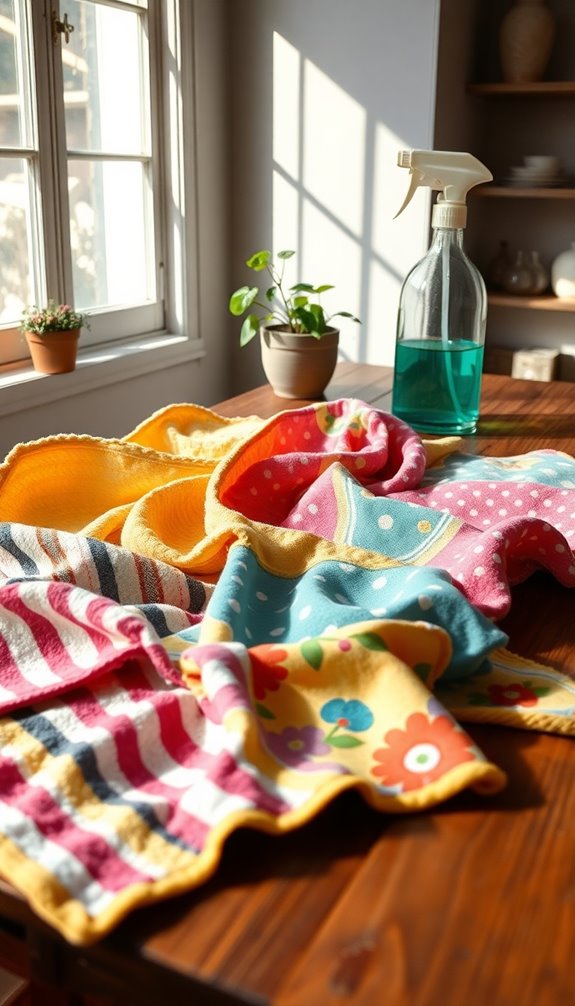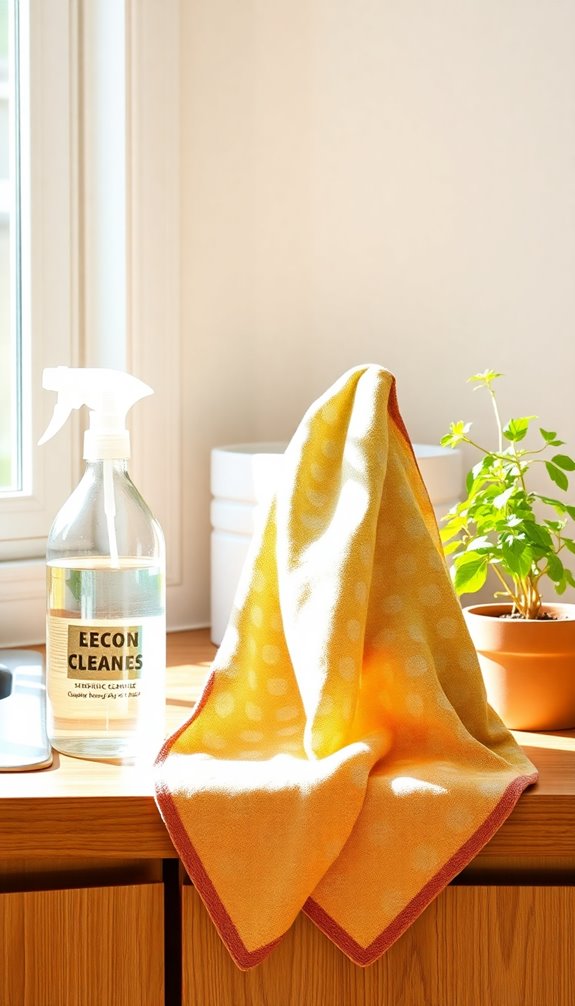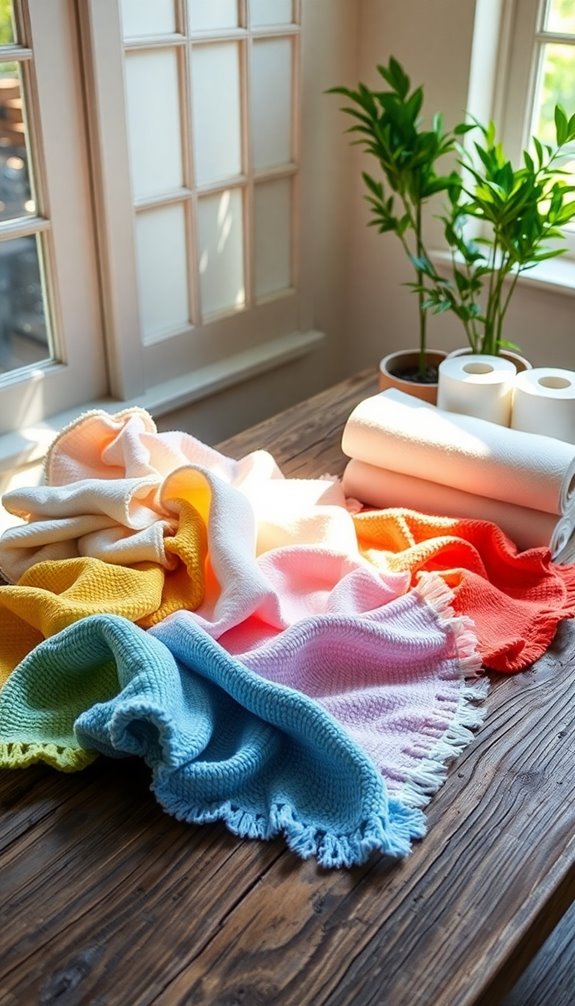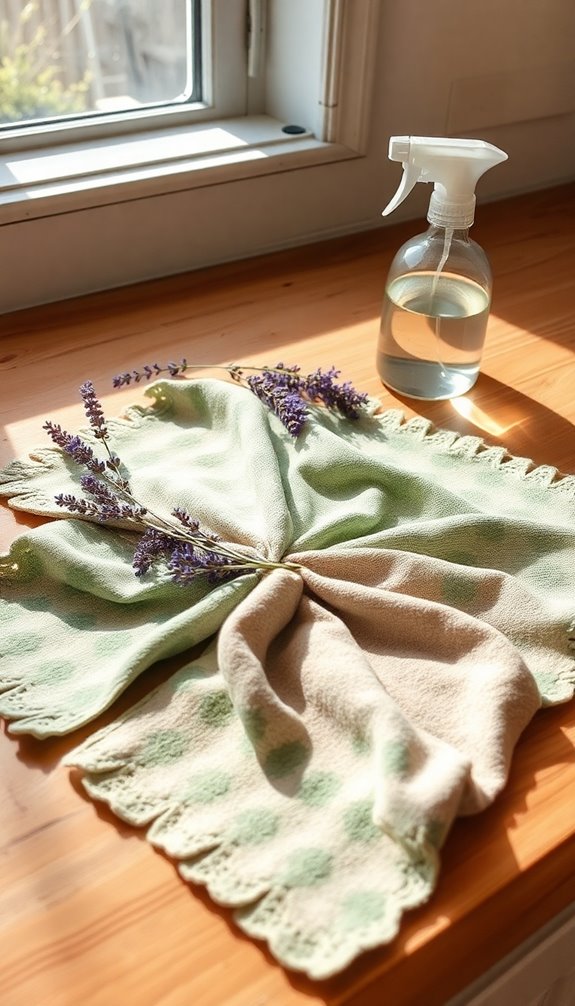For a sustainable home, consider using reusable cleaning cloths like Skoy Dishcloths or Norwex cloths. These options are not only highly absorbent but also made from eco-friendly materials. Skoy cloths can replace over 15 rolls of paper towels, while Norwex excels in bacteria removal. Both are machine washable and can be used over 40 times, cutting down on waste and saving you money. To maximize their lifespan, rinse them after use and avoid fabric softeners. When you make the switch, you contribute to a cleaner environment and a healthier home. Learn about more great choices next!
Overview of Reusable Cloths

When you consider the impact of your cleaning habits, reusable cleaning cloths emerge as an effective and eco-friendly alternative to traditional paper towels.
These cloths can absorb liquid up to 15 times their weight, making them perfect for tackling spills and messes around your home. Unlike disposable options, many reusable cleaning cloths, such as those made from cellulose and cotton, are 100% biodegradable and compostable, aligning with your sustainable lifestyle. Additionally, using natural cleaning methods promotes a healthier home environment and contributes to improving air quality by minimizing exposure to harmful chemicals.
Using cloths like the Skoy Eco-Friendly Swedish Dishcloth can save you money, as one can replace over 15 rolls of paper towels.
Plus, they're often machine washable and can be reused over 40 times, markedly cutting down on single-use waste. Their quick-drying properties help inhibit bacterial growth, ensuring you maintain a cleaner and healthier environment. Additionally, opting for sustainable cleaning tools can further enhance your eco-friendly cleaning practices.
Eco-Friendly Materials
Reusable cleaning cloths are crafted from eco-friendly materials that considerably lessen your environmental footprint.
When you choose these cloths, you're opting for a sustainable solution that's both effective and responsible. Many options are designed to be 100% biodegradable and compostable, which is a significant improvement over single-use products. Additionally, using eco-friendly cleaners like Seventh Generation All-Purpose Cleaner can enhance the overall effectiveness of your cleaning routine. By selecting these options, you also contribute to a healthier indoor environment by reducing chemical residues.
Here are some materials to look for:
- Cellulose and Cotton: Cloths made from 70% cellulose and 30% cotton break down naturally.
- Skoy Cloths: These are made from 70% wood pulp and 30% cotton, are non-GMO, unbleached, and printed with water-based inks.
- Rayon Options: 100% rayon cleaning cloths are ASTM certified biodegradable and compostable in various settings.
- Quick-Drying Fabrics: These inhibit bacterial growth while maintaining high sustainability standards. Additionally, choosing eco-friendly materials supports sustainable practices that help reduce overall waste and pollution.
Care and Maintenance

To keep your reusable cleaning cloths in top shape, follow simple washing instructions and drying techniques. Rinsing them in warm water after each use helps eliminate grime, while machine washing or dishwashing maintains their effectiveness. Consider using non-toxic cleaners to ensure that your cloths remain free from harmful chemicals while effectively sanitizing surfaces. Regular maintenance of cleaning supplies, including microfiber cloths, ensures optimal performance and longevity. Storing them in designated areas will enhance accessibility and keep your cleaning process efficient.
Washing Instructions
Proper care is essential for keeping your cleaning cloths effective and long-lasting. To guarantee they maintain their absorbency and performance, follow these washing instructions. You can machine wash your cloths or pop them in the dishwasher for easy cleaning. Just remember to use warm water and avoid fabric softeners or fillers, as these can degrade their quality.
Here are a few tips to keep in mind:
- Wash your cloths after approximately 40 uses to maintain their effectiveness.
- Hang cloths to air dry quickly, as this inhibits bacterial growth.
- For an added layer of cleanliness, soak your cloths in water and microwave them to sanitize.
- Regular washing not only keeps your cloths clean but also extends their lifespan.
Drying Techniques
After washing your cleaning cloths, the drying process plays a significant role in maintaining their effectiveness. Quick drying inhibits bacterial growth, making your cloths more hygienic for cleaning up messes around your home.
You can choose to air-dry your cloths or toss them in the dryer on a low heat setting. Both methods help maintain their absorbency and shape, which is essential for peak performance.
You might've never thought about the impact of fabric softeners or dryer sheets on your reusable cloths. Avoid using these products, as they can reduce the cloths' effectiveness.
Instead, focus on proper care techniques to extend their lifespan, allowing them to replace over 40 rolls of paper towels. This not only saves you money but also contributes to a more sustainable cleaning routine.
Longevity Tips
Keeping your reusable cleaning cloths in top shape requires a few simple practices. By following these tips, you can extend their lifespan and maintain their effectiveness for countless cleanups.
- Rinse after use: Always rinse your cloths thoroughly after each use to remove any dirt and grime. This helps preserve their absorbency.
- Air dry completely: Allow your cloths to air dry completely before storing them. This prevents mold growth and keeps them fresh.
- Skip the fabric softeners: Avoid using fabric softeners when washing your cloths. They can reduce absorbency and compromise the eco-friendly properties of the materials.
- Wash in cold water: To prevent shrinkage, wash your cloths in cold water. Also, steer clear of high heat when drying—this will help maintain their structure.
For an extra layer of cleanliness, try sanitizing your cloths by soaking them in water and microwaving them. This method effectively kills bacteria without harsh chemicals.
Performance Comparisons
When it comes to cleaning, you want to know which cloths really get the job done.
We'll compare cleaning efficiency, durability, and cost-effectiveness so you can make informed choices. Additionally, using organic products can enhance your cleaning routine while promoting a healthier home environment.
Let's see how different options stack up against each other.
Cleaning Efficiency Assessment
In evaluating cleaning efficiency, it's clear that not all cloths are created equal. When you're looking for the best reusable cleaning cloths, you'll notice significant differences in performance.
Norwex cleaning cloths stand out, scoring a remarkable 4.5/5. Their strong grip and ability to eliminate up to 99% of bacteria with just water justify the higher price.
Dollar Tree microfiber cloths also offer great value, earning a solid 4.5/5 for durability and grip, making them perfect for everyday kitchen messes.
In contrast, standard dish cloths struggle with tougher stains, scoring only 3/5, while paper towels fall short with a dismal 2/5 for their inability to tackle sticky messes.
On the brighter side, Skoy Eco-Friendly Swedish Dishcloths absorb an impressive 15 times their weight, providing a sustainable alternative to single-use products.
Here's a quick recap of cleaning cloth performance:
- Norwex: 4.5/5, great bacteria removal
- Dollar Tree Microfiber: 4.5/5, cost-effective option
- Standard Dish Cloths: 3/5, struggles with tough stains
- Paper Towels: 2/5, poor absorption for sticky messes
Durability and Longevity
Durability and longevity are essential factors to assess in reusable cleaning cloths, and the differences can be striking.
Take Skoy Eco-Friendly Swedish Dishcloths, for instance; they can replace over 15 rolls of paper towels, proving their exceptional durability for various cleaning tasks.
If you're looking for excellent performance, the Norwex Cleaning Cloth shines with a perfect score of 5/5 in both durability and grip. It effectively removes up to 99% of bacteria just with water, promoting longevity through its self-sanitizing features.
On a budget? Dollar Tree microfiber cloths still deliver, with a durability score of 4/5, especially effective on tougher messes like peanut butter and jelly.
For those opting for sustainable materials, cloths made from 100% rayon can be washed and reused over 40 times, greatly extending their lifespan compared to single-use products.
Additionally, the Leihōkū Reusable Cloth Set, made from 70% cellulose and 30% cotton, dries quickly, inhibiting bacterial growth and enhancing overall durability.
Choosing the right cloth means investing in sustainable cleaning solutions that last, making your cleaning routine both efficient and environmentally friendly.
Cost-Effectiveness Analysis
Choosing reusable cleaning cloths not only impacts their durability but also affects your wallet. By opting for cloths like those made from 100% rayon, you can replace over 15 rolls of paper towels, which translates to about $18 in annual savings.
The Skoy Eco-Friendly Swedish Dishcloth, priced at $7.99, not only promises to outperform traditional sponges and paper towels but also proves to be a cost-effective solution for your cleaning needs.
Here's a quick comparison of options to evaluate:
- Dollar Tree microfiber cloths: Scored 4.5/5 for performance, these are the most affordable without compromising quality.
- Norwex cleaning cloths: Higher-priced but offer long-lasting durability, potentially reducing your overall cleaning supply expenses.
- Skoy Eco-Friendly Dishcloths: More absorbent and durable than traditional options, making them worth the investment.
- Reusable cloths: Investing in quality can lead to lower long-term costs as they replace disposable products.
In essence, while some options require a higher upfront cost, their long-term savings and sustainability benefits often make them the smarter choice.
Cost-Effectiveness

How much could you save by switching to reusable cleaning cloths? By making the switch, you could replace over 40 rolls of paper towels, leading to significant savings in your household expenses.
For instance, the Skoy Eco-Friendly Swedish Dishcloth can substitute for 15 rolls of paper towels, potentially saving you around $18 annually.
Reusable cleaning cloths aren't just eco-friendly; they're also incredibly efficient. Their ability to absorb 15 times their weight in liquids means you won't need multiple disposable products, further trimming your cleaning costs.
Take the Leihōkū Reusable Cloth Set, priced at $20.00. It pays for itself quickly when you consider that each cloth can be washed and reused over 40 times, maximizing your savings compared to single-use options.
In the long run, investing in reusable cloths means you're not just saving money; you're also contributing to a more sustainable lifestyle.
Customer Experiences
Customers often share their enthusiasm for reusable cleaning cloths, highlighting their remarkable absorbency and versatility. Many users report these cloths can absorb up to 15 times their weight in liquids, making them perfect for handling spills without missing a beat.
Plus, the eco-friendly aspect really stands out, as one cloth can replace over 40 rolls of paper towels, translating to significant savings on your grocery bill.
Here are some key points from customer feedback:
- Durability: Many find that these cloths can be washed and reused over 40 times without losing effectiveness.
- Quick-Drying: Users appreciate that the quick-drying feature helps inhibit bacterial growth, making cleaning tasks more hygienic.
- Versatility: Customers love using them for various tasks, whether it's wiping down kitchen counters or dusting surfaces.
- Cost-Effectiveness: The reduction in paper towel usage leads to noticeable savings, which many customers highlight as a major benefit.
With all this positive feedback, it's clear that reusable cleaning cloths are a game changer for those looking to maintain a sustainable and efficient home.
Sustainable Practices

Reusable cleaning cloths are a smart choice for anyone committed to sustainable practices. By opting for these cloths, you can considerably reduce your consumption of single-use paper towels. In fact, just one reusable cloth can replace over 40 rolls of paper towels, leading to less waste in landfills.
Many of these cloths are made from biodegradable and compostable materials, like the Leihōkū Reusable Cloth Set, which consists of 70% cellulose and 30% cotton.
Not only are reusable cloths environmentally friendly, but they're also highly effective. They can absorb liquids up to 15 times their weight, making them more efficient than traditional sponges and paper towels.
Switching to options like Skoy cloths can also save you money—approximately $18 annually—by cutting down on paper towel expenses.
Durability is another key advantage. Many eco-friendly cleaning cloths are designed for machine washing and can be reused over 40 times. This promotes a sustainable cleaning routine that benefits both your home and the planet.
Additional Product Recommendations
Choosing reusable cleaning cloths is just the beginning of creating a more sustainable cleaning routine.
To enhance your eco-friendly efforts, consider these additional product recommendations that fit various needs and budgets:
- Leihōkū Reusable Cloth Set: Priced at $20.00, this set includes three absorbent cloths made from 70% cellulose and 30% cotton, capable of soaking up liquid up to 15 times their weight.
- Skoy Eco-Friendly Swedish Dishcloths: These biodegradable cloths replace over 15 rolls of paper towels and are made from 70% wood pulp and 30% cotton, featuring a non-GMO, unbleached design.
- Norwex Cleaning Cloths: Known for their durability, these cloths eliminate up to 99% of bacteria using just water and come with a two-year warranty, making them a reliable choice.
- Dollar Tree Microfiber Cloths: If you're on a budget, these cloths offer great performance against tough kitchen messes, scoring high for durability and grip.
Conclusion
Incorporating reusable cleaning cloths into your home transforms your cleaning routine into a sustainable practice. Imagine wiping down surfaces with soft, vibrant fabrics that not only shine but also reduce waste. Each time you reach for a cloth, you're choosing a greener path, leaving behind a trail of eco-consciousness. By investing in these cloths, you're not just cleaning; you're nurturing the planet, one swipe at a time, making your home a haven of sustainability.